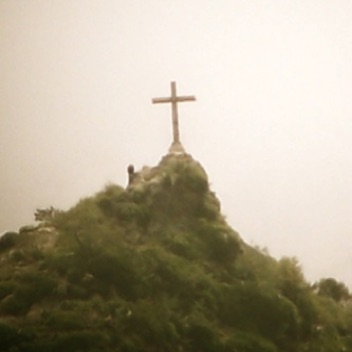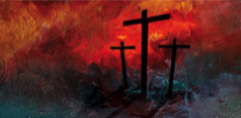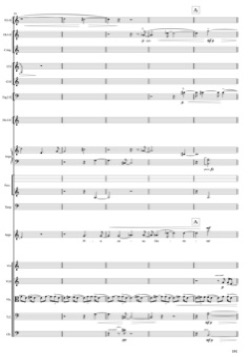Requiem
in memory of the victims from Utøya, 22 July 2011
commissioned by DR National Symphony Orchestra (2009-2010)
First performance: DR Koncerthuset Friday 5 April 2013
A version for smaller chorus and organ (2019) will be premiered
March and October 2022 by Ars Nova Copenhagen

November 2010
Finally I reached the end of my giant project: There is no greater challenge for a composer than writing a Requiem.
A huge and fascinating task, yes. But also frightening! You have to create a sound world that gives room for the biggest and most fundamental aspects of human life: Life and death, desperation and consolation, hope and fear, doom and mercy - Heaven and Hell. It is immense forces that are to be evoced.
Nowhere else in the Christian liturgy do you meet more expressive colours or dramatic contrtasts than here in the Requiem text. From the fever nightmares in Dies irae till solemn prayers and contemplative calm in Lux aeterna. From tearful sorrow in Lacrymosa till paceful transcendence of In Paradisum. No wonder that the two great opera composers Mozart and Verdi wrote masterpieces in this higly dramatic genre.
In my work I have been inspired by the tension between the obvious drama of the text and the classic, static form of the ritual. This lies already in the Latin language which is archaisizing, almost beyond time and space. The ritual in itself has a power or inertia that lifts up the expressive and dynamic content of the text into a super-personal sphere. In this respect a Requiem is clearly different from an opera: Where in an opera you would often enlarge and underline the subjective feelings of your dramatic figures, the liturgy of the death mass serves to ritualize and generalize the drama of death. A classic opera is brought forward by intrigues and psycological tensions, a Requiem by the mere magic of the rite.
So I see the ancient Latin text as a sort of 'frozen'
drama. A religious theatre about daeth and man's
fear of death, played in a timeless atmosphere - a
celebration of the sufferings of all mankind, to all times.
This is perhaps the secret of the liturgy's consolational function: When we are at the very edge of life, it is in
fact from the universitality of the religious ritual we can
sometimes find a sort of meaning in what seems
meaningless.
But I have had the ambition to build yet another perspective on top of all this. I wanted to create a Requiem that is true to the ancient tradition, and at the same time is speaking loud and clearly into our own time. Therefore I have chosen to put up against the Latin text a cycle of modern hymns by the Danish author Simon Grotrian. He already had a long production of avant garde poetry, when suddenly a few years ago he surprised everybody and released a collection of hymns in very traditional forms: Strophes, rhymes, metaphores with clear reference to the Bible and to old Danish hymns. And still his images and associations always tend to collapse and make interesting self-contradicions which demand further thinking of the reader. It is my hope that the subjective sensual universe of Grotrian and the universal Latin ritual will create a friction that can open the doors to new interpretations and experiences.
The opposition of the two worlds and times, the one of Grotrian and the one of the Latin liturgy, finds a parallel in obvious contrasts in the music. The Grotrian hymns are to be sung by a rock singer or an actor - an untrained voice, in classical terms - accompanied only by the organ; whereas the Latin text is set for four classical soloists, choir and symphony orchestra. The hymns are kept in a rather simple melodic shape (you can hear one of them by clicking to the left of this text). The rest of the work has a more complex musical language.
August 2012
I have decided to dedicate my Requiem to the memory of the victims of the Utøya massacre in Norway 22 July 2011, when a maniac from the extreme right killed 69 young people on a political summer camp. This crime happened almost a year after I finished the work, so the piece is not written with this disaster in mind. But such an ice cold and cynical action questions many of our fundamental social and ethical values, and it has created a collective fear and despair that calls for a Requiem.
The mass murder has claimed a status as a "Holy Worrier", as a Christian fundamentalist. With my dedication I want to show my disrespect of his sick interpretation of Christianity. His God is not my God! But who then is my God? A catastrophe as this hits the very core of our deepest doubts and the eternal religious paradox: If God is truely good and almighty, why on Earth does he allow such things to happen?
We will never get an answer to that. We can only cling to faith, hope, and love. But the wild Dies irae does at least offer us a moment where we can cry out our despair and our fear of death. Only to let us be elevated afterwards towards the Paradise and the Lux aeterna.
Rest in piece, innocent youngsters.
Requiem aeternam.
John Frandsen

Lux aeterna
Sine Bundgaard, sopran
DR National Symphony Orchestra
DR National Choir
Conductor: Henrik Vagn Christensen
A tour of the outer limits
by Jørgen I. Jensen
The impossible
A major, fully developed requiem – a mass for the dead – for soloists, choir and orchestra, perpetuating the grand tradition of requiem masses; a musical unfolding of the whole medieval Latin text with roots all the way back to the early Church; written by a Danish composer with a cultural consciousness that is contemporary in every way.
One cannot help wondering how this is at all possible. It shouldn’t be, given the spirit of the times, which requires topical, manageable, sensational, sophisticated, instantly affective art. In fact at the mo- ment the spirit of the age largely propagandizes for total, emotionally uncomplicated ‘presence’ of the positive, feelgood variety, massively rejecting the past as no longer meaningful.
There is only one reality, one touchstone – ME, the ego – and it might almost seem that the composer John Frandsen, besides so much else, has intended to give all the egos all the relevance they might wish, centring on the fact that every ego is finite and must die. It is here that a greater world begins to make its appearance.
It can also be said in a more ordinary way: John Frandsen has found a new path into the ancient text.
excerpt of the cd booklet
John Frandsen has achieved a modern milestone...
Frandsen has marshalled his large choral and orchestral forces with a resolute mastery, clearly relishing the vivid imagery and word-painting opportunities...
This eloquent statement deserves the widest circulation.
Malcolm Riley
Gramophone, Nov. 2014
Frandsen’s substantial score for large orchestra, chorus and vocal soloists is by turns lavish and sombre, electrifying and meditative (...)
a worthy and affecting tribute to those lives lost.
Kate Wakeling
BBC Music Magazine, Jan 2015
A cd recording of Requiem has been released by DACAPO
Click here to download the text
for John Frandsens Requiem.
Part of the Requiem is a cycle of new hymns by the Danish author Simon Grotrian.
Read more (in Danish).
Published by
